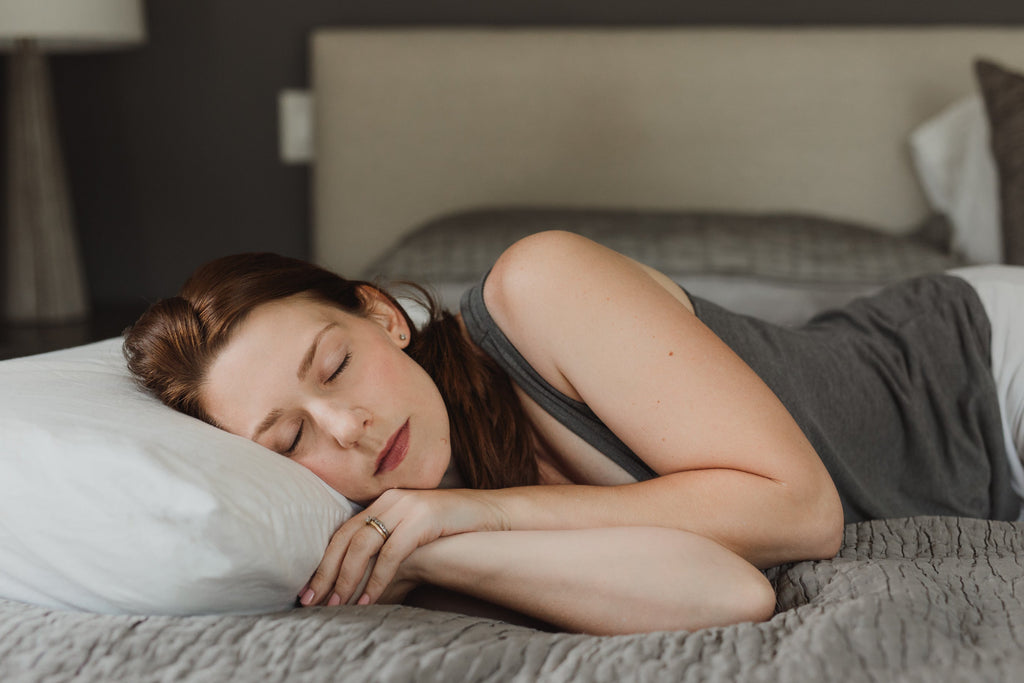Who doesn’t want to sleep better? As a society, many of us struggle to get enough rest, with roughly two-thirds of adults in developed countries not meeting the recommended 8 hours of sleep each night. However, getting quality sleep plays an important role in overall well-being. It can help you feel more energized, support your body's natural defenses, and promote a more refreshed and balanced start to each day..
With the launch of our new sleep formulas—Mental Tranquility (for occasional stress-related sleeplessness) and Cool Slumber (for those who tend to sleep warm)—we encourage you to create a personal “sleep ritual.” Establishing a consistent evening routine may help promote more restful and uninterrupted sleep over time.
We’re creatures of habit: break some of your old habits, create some new, and become more alert, awake, and alive for the two-thirds of your life that is not spent in the bedroom.

How to create an Effective Sleep Ritual
- Keep your phone and other blue light–emitting devices out of the bedroom. The LED light from these screens may suppress melatonin production, which plays a role in the body’s natural sleep-wake cycle. While it might be one of the hardest habits to break, avoiding screens before bed could make a big difference in how quickly you fall asleep. Try turning off devices at least 60 minutes before bedtime for better rest.
- Create a relaxation routine before going to bed. We recommend a comforting shower, free reading (again, not on your phone), or 20 minutes of journaling. Transition both your mind and body into the bedtime process and let your body naturally relax and fall to sleep.
- Be mindful of what you eat and drink in the evening. Heavy meals or certain foods may contribute to digestive discomfort, which can make it harder to rest well through the night. Opt for lighter options if you're eating close to bedtime.
- Keep a consistent sleep schedule, both going to bed and waking up at the same time each day. Even on the weekends! Moreover, if you find yourself awake in the night, consider getting out of bed to do something that’s relaxing, rather than becoming stressed out by staring at your clock (consider removing your clock from the bedroom as well). At some point, your body will want to go back to bed.
- Maintain a balanced diet, and consider incorporating foods traditionally associated with supporting restful sleep. Our blog features a variety of recipes designed to complement your evening routine—here’s one to get you started.
-
Be mindful of alcohol intake in the evening. While it may initially make you feel drowsy, it may impact how rested you feel the next morning, even if you don’t recall waking during the night. This may be one reason you feel less rested the next day, even if you don’t remember waking during the night.
Cutting back on alcohol can be challenging, so consider easing into it by reducing intake gradually or limiting consumption to certain days of the week. As part of your bedtime routine, our sleep formulas may offer a natural alternative to help support a more relaxing evening wind-down.
Consider this: if you’re getting the recommended eight hours, that’s 1/3 of your life spent sleeping! Don’t neglect your sleep, but rather incorporate some of the above to make it better. The positive impact on your day ahead can be incredible.
Care Consideration: Just a reminder that the above information is not a substitute for medical care and is not a substitute for medical advice or recommendations from a healthcare provider. This information is not intended to treat, mitigate, or cure any disease. That said, we encourage you to connect with an Acupuncturist in your community to learn more about this and other Traditional Chinese Medicine options. If you’ve got questions about Chinese herbal medicine or getting started with an Acupuncturist, feel free to connect with us at hello@mydaolabs.com.
















